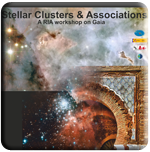A sub-parsec resolution simulation of the Milky Way: global structure of the interstellar medium and properties of molecular clouds
Renaud, F.; Bournaud, F.; Emsellem, E.; Elmegreen, B.; Teyssier, R.; Alves, J.; Chapon, D.; Combes, F.; Dekel, A.; Gabor, J.; Hennebelle, P.; Kraljic, K.
Monthly Notices of the Royal Astronomical Society, Volume 436, Issue 2, p.1836-1851 (2013).
12/2013
ABSTRACT
We present a self-consistent hydrodynamical simulation of a Milky Way-like galaxy at a resolution of 0.05 pc. The model includes star formation and a new implementation of stellar feedback through photoionization, radiative pressure and supernovae. The simulation resolves the structure of the interstellar medium at sub-parsec resolution for a few cloud lifetimes and at 0.05 pc for about a cloud-crossing time. The turbulence cascade and gravitation from kpc scales are de facto included in smaller structures like molecular clouds. We show that the formation of a bar influences the dynamics of the central ˜100 pc by creating resonances. At larger radii, the spiral arms host the formation of regularly spaced clouds: beads on a string and spurs. These instabilities pump turbulent energy into the gas, generally in the supersonic regime. Because of asymmetric drift, the supernovae explode outside their gaseous nursery, which diminishes the effect of feedback on the structure of clouds. The evolution of clouds is thus mostly due to fragmentation and gas consumption, regulated mainly by supersonic turbulence. The transition from turbulence-supported to self-gravitating gas is detected in the gas density probability distribution function at ˜2000 cm-3. The power-spectrum density suggests that gravitation governs the hierarchical organization of structures from the galactic scale down to a few pc.


